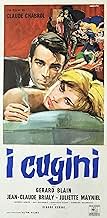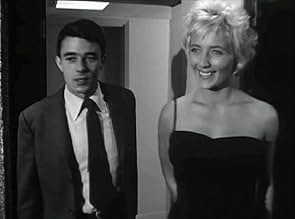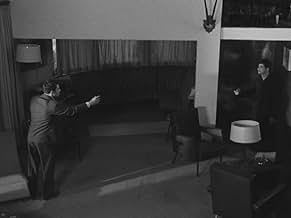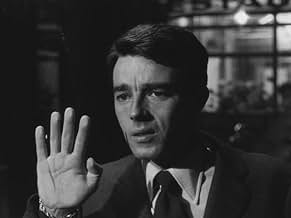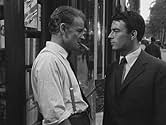AVALIAÇÃO DA IMDb
7,2/10
3,4 mil
SUA AVALIAÇÃO
Adicionar um enredo no seu idiomaA pair of cousins share a flat, but animosity begins to build between the two when a woman gets involved.A pair of cousins share a flat, but animosity begins to build between the two when a woman gets involved.A pair of cousins share a flat, but animosity begins to build between the two when a woman gets involved.
- Direção
- Roteiristas
- Artistas
- Prêmios
- 1 vitória no total
- Direção
- Roteiristas
- Elenco e equipe completos
- Produção, bilheteria e muito mais no IMDbPro
Avaliações em destaque
The naive mama's boy Charles (Gérard Blain) moves to Paris to live with his debauched bon-vivant cousin Paul Thomas (Jean-Claude Brialy) in his apartment. He meets Paul's friend, the pervert pimp Jean "Clovis", who is older than them. Paul studies hard and writes daily to his mother while Paul gives frequent parties and neither studies nor goes to lectures. When Charles meets Paul's friend, the gorgeous and promiscuous Florence (Juliette Mayniel), he falls in love with her. They talk later through telephone and Florence understands the invitation of Charlie to meet her wrongly and arrives earlier at his apartment. She meets the cynical Paul and Clovis that tell her that she is a slut and will cheat Charlie when she becomes bored with him, and she ends having sex with Paul. Florence moves to the apartment to live with Paul, disturbing the attention of Charlie in his studies. When the final exams come, there is a tragedy.
"Les cousins" (1959) is the second film directed by Claude Chabrol, with the story of two cousins and depicting an empty generation. One cousin is from the countryside, naive, shy and mama's boy; the other is popular and pervert, although protecting his cousin most of the time. The beautiful Juliette Mayniel performs a key element in the story, since Charles has a crush on her, but Paul destroys their relationship since the twenty-year-old woman is promiscuous and has slept with most of his friends. However, the concentration of Charles is lost, and he fails his exam. The tragic conclusion is very sad. My vote is seven.
Title (Brazil): "Os Primos" ("The Cousins")
"Les cousins" (1959) is the second film directed by Claude Chabrol, with the story of two cousins and depicting an empty generation. One cousin is from the countryside, naive, shy and mama's boy; the other is popular and pervert, although protecting his cousin most of the time. The beautiful Juliette Mayniel performs a key element in the story, since Charles has a crush on her, but Paul destroys their relationship since the twenty-year-old woman is promiscuous and has slept with most of his friends. However, the concentration of Charles is lost, and he fails his exam. The tragic conclusion is very sad. My vote is seven.
Title (Brazil): "Os Primos" ("The Cousins")
Les Cousins is definitively part of the French New Wave of the late 1950s. Whilst slightly more polished than the films of his contemporaries (notably Godard and Truffaut), Chabrol's film bubbles with an insurgence of new cinematographic techniques and fresh acting talent. The sense of newness is reinforced by presence of so many young actors, dressed elegantly in tuxedos and evening dresses, but acting somewhat delinquently for the most part. The film appears almost like the christening party for the birth of a new era in French cinema.
Both the direction and photography are of a high calibre and capture very well the changing mood of the central character, Charles. The film starts cheerfully and optimistically with the young man's arrival in Paris. Like him, we are enchanted by the bright lights, the wide boulevards and the historic monuments. But then, little by little, the mood changes to ennui and disappointment when the shallowness of the Paris jet set is revealed. Finally, a much darker mood prevails as Charles' best efforts to succeed are brutally crushed by a combination of circumstances, partly of his own making but largely as a result of the hand of fate. This ability to alter the mood of the film so subtly and effectively is one of Chabrol's great skills as a director and is used to far greater effect in some of his subsequent thrillers.
Both of the two central characters, Charles and Paul, are played admirably by Gérard Blain and Jean-Claude Brialy. Blain manages to capture the innocence of the outsider and offers a sympathetic and memorable performance. Brialy seems to revel in his role as the extravagant city student, hosting his parties with the gusto of a true bon-vivant, whilst exhibiting a more complicated and sensitive persona in his conversations with the characters Charles and Florence.
Both actors were used by Chabrol in an earlier film, Le Beau Serge, which, in some ways, is the mirror image of Les Cousins. In Le Beau Serge, Brialy played a city boy who returns to his home in a provincial town where he met up wih a childhood friend played by Blain. Brialy's character was the outsider and ultimately he was destroyed by his alien surroundings. In Les Cousins, the situation is cleverly reversed. Here, Blain's character is a country boy who joins Brialy in the city of Paris. It is Blain's character who is now the outsider, and who is finally destroyed by his unfamiliar environment. It is interesting to watch the two films back-to-back, to note the similarities and compare the differences. Both films seem to side with the outsider and condemn the society that rejects him, although it is perhaps disappointing that, in both cases, that the outsider is destroyed without having any significant impact on the society that crushed him. At least, in Le Beau Serge, the victim's fate was sealed by an altruistic desire to do some good for the community that rejected him, whereas in Les Cousins, the victim brought his destruction on himself by trying to attack the society he felt so repulsive.
Les Cousins lacks the emotional intensity of Le Beau Serge and appears in some places a little too stage-managed. (The ending is particularly stagy, but it works perfectly to the film's advantage.) On the plus side, Les Cousins benefits from a far superior musical score, a more interesting set of characters, and some impressive location filming in Paris. It is an engaging and accessible film which still appears fresh and vibrant.
Both the direction and photography are of a high calibre and capture very well the changing mood of the central character, Charles. The film starts cheerfully and optimistically with the young man's arrival in Paris. Like him, we are enchanted by the bright lights, the wide boulevards and the historic monuments. But then, little by little, the mood changes to ennui and disappointment when the shallowness of the Paris jet set is revealed. Finally, a much darker mood prevails as Charles' best efforts to succeed are brutally crushed by a combination of circumstances, partly of his own making but largely as a result of the hand of fate. This ability to alter the mood of the film so subtly and effectively is one of Chabrol's great skills as a director and is used to far greater effect in some of his subsequent thrillers.
Both of the two central characters, Charles and Paul, are played admirably by Gérard Blain and Jean-Claude Brialy. Blain manages to capture the innocence of the outsider and offers a sympathetic and memorable performance. Brialy seems to revel in his role as the extravagant city student, hosting his parties with the gusto of a true bon-vivant, whilst exhibiting a more complicated and sensitive persona in his conversations with the characters Charles and Florence.
Both actors were used by Chabrol in an earlier film, Le Beau Serge, which, in some ways, is the mirror image of Les Cousins. In Le Beau Serge, Brialy played a city boy who returns to his home in a provincial town where he met up wih a childhood friend played by Blain. Brialy's character was the outsider and ultimately he was destroyed by his alien surroundings. In Les Cousins, the situation is cleverly reversed. Here, Blain's character is a country boy who joins Brialy in the city of Paris. It is Blain's character who is now the outsider, and who is finally destroyed by his unfamiliar environment. It is interesting to watch the two films back-to-back, to note the similarities and compare the differences. Both films seem to side with the outsider and condemn the society that rejects him, although it is perhaps disappointing that, in both cases, that the outsider is destroyed without having any significant impact on the society that crushed him. At least, in Le Beau Serge, the victim's fate was sealed by an altruistic desire to do some good for the community that rejected him, whereas in Les Cousins, the victim brought his destruction on himself by trying to attack the society he felt so repulsive.
Les Cousins lacks the emotional intensity of Le Beau Serge and appears in some places a little too stage-managed. (The ending is particularly stagy, but it works perfectly to the film's advantage.) On the plus side, Les Cousins benefits from a far superior musical score, a more interesting set of characters, and some impressive location filming in Paris. It is an engaging and accessible film which still appears fresh and vibrant.
Chabrol's second film, made months after his first Le Beau Serge, and a more mature film director is evident. Helped, no doubt by those he gathered around him notably on script and camera, while the first film had charm and passion, this has that and more. Not only is this an interesting and intriguing tale of student life and affairs late 50s, the way it is shot opens up a whole new world of cinema. At least for the next five years this new Wave would dominate French cinema and also influence most of the world's cinema. With a fluid camera movement, jump cuts and an emphasis on 'real' people, having fun, being serious about politics, smoking all the time and having sex, cinema would, as they say never be the same again. Les Cousins is all of the above and entertains and amuses. Chabrol has complete control of the music this time, which works very well - even if it includes youngsters dancing around to Wagner! Important and enjoyable - can't say fair than that.
Charles is a young provincial coming up to Paris to study law. He shares his cousin Paul's flat. Paul is a kind of decadent boy, a disillusioned pleasure-seeker, always dragging along with other idles, while Charles is a plodding, naive and honest man. He fell in love with Florence, one of Paul's acquaintances. But how will Paul react to that attempt to build a real love relationship?
Of the so-called French New Wave directors, Claude Chabrol has been called possibly the most mainstream (though less celebrated than Truffaut or Godard). We could also say he has a remarkable amount of stamina. "Les Cousins" was at the beginning of his career, and for decades he kept making great movies, including the notable "Madame Bovary" in 1991... and still kept going.
I love this film's blend of decadence and death. A simple man, with studies on his mind, is exposed to some bizarre scenes of sensuality, violence, crime, and even Nazi elements (in 1950s France?). This is what it is like if you take two opposing elements and allow them to spin out of control.
Of the so-called French New Wave directors, Claude Chabrol has been called possibly the most mainstream (though less celebrated than Truffaut or Godard). We could also say he has a remarkable amount of stamina. "Les Cousins" was at the beginning of his career, and for decades he kept making great movies, including the notable "Madame Bovary" in 1991... and still kept going.
I love this film's blend of decadence and death. A simple man, with studies on his mind, is exposed to some bizarre scenes of sensuality, violence, crime, and even Nazi elements (in 1950s France?). This is what it is like if you take two opposing elements and allow them to spin out of control.
Chabrol's second feature. I haven't seen his first, Le beau Serge, but this is the most French New Wave film I've seen from Chabrol. As such, it's by far my favorite. I like several of his films, but I do find even my favorites a little dry. This one is just gorgeous and it's quite a lot of fun throughout. Gerard Blain plays a provincial who is moving to Paris to go to college. He moves in with his cousin (Jean-Claude Brialy), who is himself a student. Brialy is a total party animal, spending all his free time drinking with friends and none of it studying. The two get along at first, but then a woman (Juliette Mayniel) comes between them. The film is kind of a precursor to Jules et Jim.
Você sabia?
- CuriosidadesTwo endings were filmed, one optimistic (the reconciliation between the two cousins), which was discarded, and the other pessimistic, which was finally chosen.
- Citações
Le libraire: Read Dostoyevsky. He addresses all your concerns.
- ConexõesFeatured in Fejezetek a film történetéböl: A francia új hullám (1990)
- Trilhas sonoras40e Symphonie en Sol Majeur (Koechel 550) 1er movement
Music by Wolfgang Amadeus Mozart (as W.A. Mozart)
Performed by London Symphony Orchestra (as Orchestre Symphonique de Londres)
Conducted by Josef Krips (as Joseph Krips)
Disque DECCA
Principais escolhas
Faça login para avaliar e ver a lista de recomendações personalizadas
- How long is The Cousins?Fornecido pela Alexa
Detalhes
Bilheteria
- Orçamento
- FRF 6.000.000 (estimativa)
- Tempo de duração
- 1 h 52 min(112 min)
- Cor
- Mixagem de som
- Proporção
- 1.37 : 1
Contribua para esta página
Sugerir uma alteração ou adicionar conteúdo ausente

